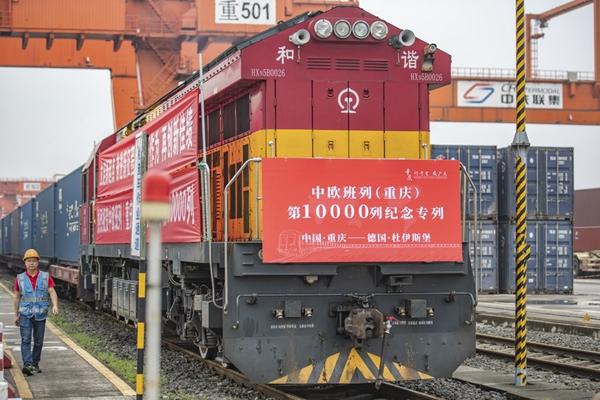

A cargo train marking the 10,000th trip made by China-Europe freight trains operated by the China-Europe Railway Express (Chongqing), waits for departure at
Tuanjie Village Central Railway Station in Chongqing, southwest China, June 23, 2022. [Photo/Xinhua]
An upcoming series of visits to Beijing by European leaders will send signals of solidarity and cooperation between China and the European Union, adding positive energy to world peace, stability and sustainable development, officials and observers said.
French President Emmanuel Macron said on Saturday that he would visit China in early April, with the Ukraine crisis high on the agenda. Speaking a day after China issued a 12-point position paper on the political settlement of the issue, Macron said, "The fact that China is engaging in peace efforts is a good thing."
European Commission President Ursula von der Leyen and European Council President Charles Michel also might visit China in the first half of the year, with preparations already underway.
Fu Cong, head of the Chinese Mission to the European Union, who struck a very optimistic tone on the recovery of China-EU relations in a recent interview, said the two sides are expected to usher in frequent, high-level mutual visits very soon.
It was also reported that Italian Prime Minister Giorgia Meloni will visit China this year.
The planned visits show that the Ukraine crisis should not affect the development of China-EU relations, Fu said, suggesting that the EU should avoid being too emotional in dealing with the issue.
The media spotlight has shone on China-EU ties recently. Senior diplomat Wang Yi just concluded his first visit of the year, which took him to France, Italy, Hungary and Russia, as well as Germany for the Munich Security Conference.
China and Europe should dispel external disruptions, properly manage differences and strengthen communication and cooperation when referring to the spillover effects of the Ukraine crisis, said Wang, director of the Office of the Foreign Affairs Commission of the Communist Party of China Central Committee, on Wednesday after wrapping up his tour.
During his trip, Wang repeatedly expressed China's willingness to seek friendship and expand cooperation, saying China and Europe are partners, not opponents, and constitute opportunities, not threats, for each other.
"I believe China-Europe relations will present a look of positive development this year," Wang told the media, saying that China and the European countries are willing to fully resume institutional dialogue and exchanges in various areas at an early date and expand mutually beneficial economic and trade cooperation.
Over the past year, China and Europe have maintained frequent high-level contacts. President Xi Jinping held in-depth exchanges with EU leaders through face-to-face talks, virtual meetings and phone calls more than 20 times, playing a leading strategic role in advancing China-EU ties.
"The upcoming visits by EU leaders not only reflect China's important status in the international arena but also underline the strong resilience of China-EU ties, though they are currently constrained by some factors," said Chen Xulong, a professor at the University of International Business and Economics' School of International Relations.
China and the EU should remove misunderstanding and shore up cooperation, as they share extensive common interests and shoulder great responsibilities for global governance, he said.
As it pursues an independent foreign policy of peace, China cannot fully agree with some of the EU's positions on the Ukraine issue and does not want the issue to affect the development of China-EU relations, Chen said.
Still, China's responsible and constructive role in promoting peace talks on the Ukraine crisis has resonated well in the world and among some European countries, Chen added.
Stephane Dujarric, a United Nations spokesman, said on Friday that China's position paper on the political settlement of the Ukraine crisis represents "an important contribution".
